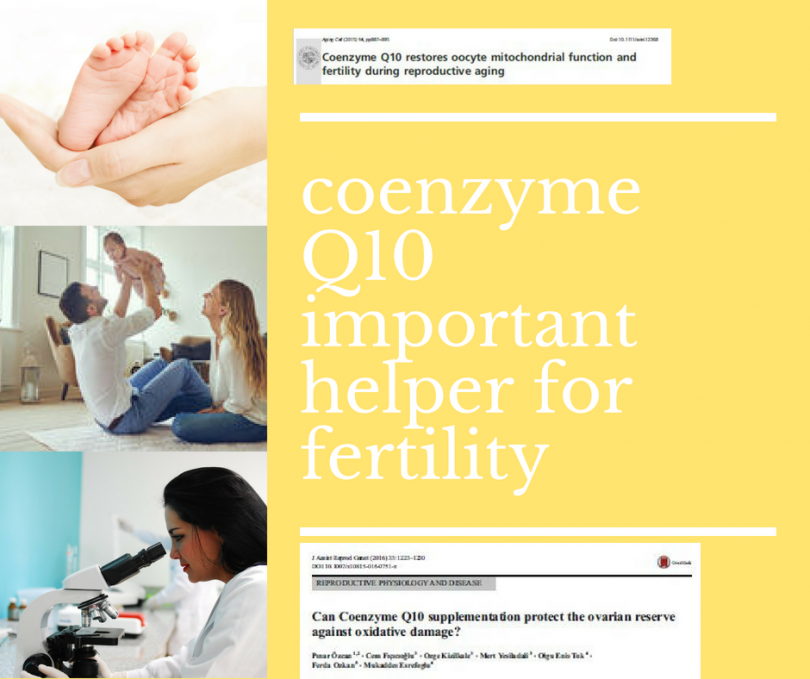Coenzyme Q10 – you may have encountered this term in capital letters on anti-wrinkle creams.
I can’t help but thinking of an old prof of mine who used to say: „ putting coenzyme Q10 on your skin, that’s just like putting a steak on a starving man’s stomach… you have to eat it to benefit from its effects!”
But: What the heck is this coenzyme q10 at all? Why do we find it in anti-aging creams and food supplements? Which effects did that old prof refer to? And how can I benefit from all of this with respect to my fertility?
„Q10 is one of the most important discoveries of nutritional sciences during the past decades.“
Prof. Dr. Linus Pauling, vitamin researcher and 2-fold Nobel Prize laureate
Coenzyme Q10 and cellular energy
Coenzyme Q10 is a fat-soluble component that plays a role in cellular energy-production. In 1957, a biologist first detected it in cattle hearts. Indeed, coenzyme Q10 can be found in almost every cell of our body. More precisely, it is present in the inner membrane of our mitochondria. These are the cell organells responsible for the majority of energy production and are therefore often referred to as “cellular power-plants”. Coenzyme Q10’s main job is to transport electrons from one enzyme complex to another in the respiratory chain. In 1978, British scientist Peter D. Mitchell was awarded the Nobel Prize for chemistry for his landmark discoveries with respect to cellular energy production in mitochondria. Coenzyme Q10, which is also called vitamin Q10 or ubiquinone, and its transport function are a major prerequisite for this main form of energy generation and thus form the basis for our body’s vitality and performance.
Sources of coenzyme Q10
Coenzyme Q10 is partly produced by the body itself. Another part is taken up via our diet. It is abundant in meat, fish, legumes, nuts and seeds, plant oils, crucifers, onions and potatoes. However, cooking quickly destroys it.
Coenzyme Q10-deficiency
Normally, our body has enough coenzmye Q10. However, endogenous production declines with age. This can be observed from approximately 30 years. In addition to that, an unhealthy diet, alcohol and cigarettes lead to decreased endogenous synthesis, as well.
As a consequence, cells have much less energy. Depending on the type of cell, effects vary: skin gets slack, muscles weak, and oocytes and spermatozoa suffer, too. Oocytes usually have diminished quality, spermatozoa show not only a decline in morphology and motility, but also in numbers.
Supplementing coenzyme Q10
The good news: it is simple and not expensive to supplement coenzyme Q10. Once it has reached its target, the cellular power plants, it can revive the process of energy production and contribute to improved energy levels in the body.
Thus, coenzyme Q10 acts a s a true all-rounder. It prevents skin aging from within, and strengthens our heart, nervous and immune system.
Independently, coenzyme Q10 also protects us in its role as as an antioxidant. It helps us to deal with detrimental reactive oxygen species, pro-oxidants that are formed during energy production in our cells. With the aid of antioxidants such as coenzyme Q10, our body can counteract reactive oxygen species, thus preventing oxidative damage to cells and tissues. This helps to stabilize the natural equilibrium between pro-oxidants and antioxidants and delays aging processes.
This is particularly important for healthy fertility, as it is well known that oocytes and spermatozoa are particularly sensitive to oxidative damage.
In conformance with this, studies revealed that supplementing coenzyme Q10 prior to pregnancy can improve oocyte quality in women and sperm quality in men.
In addition to that, there are hints that taking a coenzyme Q10 supplement can also have benefits for maintenance of ovarian reserve.
References:
Balercia G, Mosca F, Mantero F, Boscaro M, Mancini A, Ricciardo-Lamonica G, Littarru G. Coenzyme Q(10) supplementation in infertile men with idiopathic asthenozoospermia: an open, uncontrolled pilot study. Fertil Steril. 2004 Jan;81(1):93-8.
Bentov Y, Yavorska T, Esfandiari N, Jurisicova A, Casper RF. The contribution of mitochondrial function to reproductive aging. J Assist Reprod Genet. 2011 Sep;28(9):773-83.
Bentov Y, Casper RF. The aging oocyte–can mitochondrial function be improved? Fertil Steril. 2013 Jan;99(1):18-22.
Bentov Y, Hannam T, Jurisicova A, Esfandiari N, Casper RF. Coenzyme Q10 Supplementation and Oocyte Aneuploidy in Women Undergoing IVF-ICSI Treatment. Clin Med Insights Reprod Health. 2014 Jun 8;8:31-6
Babayev E, Seli E. Oocyte mitochondrial function and reproduction. Curr Opin Obstet Gynecol. 2015 Jun;27(3):175-81
Ben-Meir A, Burstein E, Borrego-Alvarez A, Chong J, Wong E, Yavorska T, Naranian T, Chi M, Wang Y, Bentov Y, Alexis J, Meriano J, Sung HK, Gasser DL, Moley KH, Hekimi S, Casper RF, Jurisicova A. Coenzyme Q10 restores oocyte mitochondrial function and fertility during reproductive aging. Aging Cell. 2015 Oct;14(5):887-95.
Kobori Y, Ota S, Sato R, Yagi H, Soh S, Arai G, Okada H. Antioxidant cosupplementation therapy with vitamin C, vitamin E, and coenzyme Q10 in patients with oligoasthenozoospermia. Arch Ital Urol Androl. 2014 Mar 28;86(1):1-4. doi: 10.4081/aiua.2014.1.1.
Lerchbaum E, Rabe T. Vitamin D and female fertility. Curr Opin Obstet Gynecol. 2014 Jun;26(3):145-50.
Gat I, Blanco Mejia S, Balakier H, Librach CL, Claessens A, Ryan EA. The use of coenzyme Q10 and DHEA during IUI and IVF cycles in patients with decreased ovarian reserve. Gynecol Endocrinol. 2016; Jul;32(7):534-7.
Nadjarzadeh A, Shidfar F, Amirjannati N, Vafa MR, Motevalian SA, Gohari MR, Nazeri Kakhki SA, Akhondi MM, Sadeghi MR. Effect of Coenzyme Q10 supplementation on antioxidant enzymes activity and oxidative stress of seminal plasma: a double-blind randomised clinical trial. Andrologia. 2014 Mar;46(2):177-83. doi: 10.1111/and.12062. Epub 2013 Jan 7.
Özcan P, Fıçıcıoğlu C, Kizilkale O, Yesiladali M, Tok OE, Ozkan F, Esrefoglu M. Can Coenzyme Q10 supplementation protect the ovarian reserve against oxidative damage? J Assist Reprod Genet 2016; 33:1223–1230
Safarinejad MR. Efficacy of coenzyme Q10 on semen parameters, sperm function and reproductive hormones in infertile men. J Urol. 2009 Jul;182(1):237-48. doi: 10.1016/j.juro.2009.02.121. Epub 2009 May 17.
Safarinejad MR. The effect of coenzyme Q₁₀ supplementation on partner pregnancy rate in infertile men with idiopathic oligoasthenoteratozoospermia: an open-label prospective study. Int Urol Nephrol. 2012 Jun;44(3):689-700. doi: 10.1007/s11255-011-0081-0. Epub 2011 Nov 13.
Tiseo BC, Gaskins AJ, Hauser R, Chavarro JE, Tanrikut C; EARTH Study Team. Coenzyme Q10 Intake From Food and Semen Parameters in a Subfertile Population. Urology. 2017 Apr;102:100-105. doi: 10.1016/j.urology.2016.11.022. Epub 2016 Nov 22.







